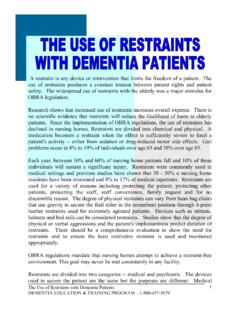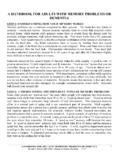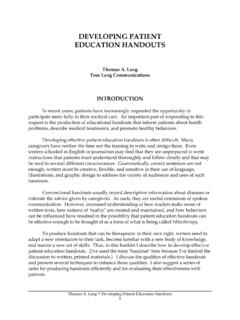Transcription of A Primary Care Guide To The Role Of Patient Compliance And ...
1 A Primary Care Guide To The Role Of Patient Compliance And Prescriptive Safety In Maintaining Cognitive successful management of chronic diseases usually requires a combination of pharmacological and health behavior interventions. A successful program requires accurate prescription by the physician and Compliance by the Patient . Prescriptive safety and Compliance are essential in the prevention or treatment of dementia or management of diseases that worsens cognitive function. Medication non- Compliance may account forup to one-third of hospital admissions among the elderly. Adverse drug reactions produced by appropriately consumed medications account for about 10% of hospitalizations. Even in monitored clinical trials, medication adherence ranges from 43% to 78% (19). Dispensing errors occur in community, pharmacies, and healthcare institutions (See Table 1). The DETA Dementia Prevention Program focuses on health conditions with defined effective treatments that may reduce risk factors for dementia.
2 For example, the long-term health problems produced by metabolic syndrome may be reduced by managing each of the disorders component including hypertension, dyslipidemia, diabetes and obesity. Reduction of severity of metabolic syndrome may reduce the risk for cognitive loss. CLICK HERE FOR MORE INFORMATION The success of any dementia prevention program will depend on long-term medication and health behavior adherence by the patients . with Pharmacological Interventions for Chronic Health Problems in AdultsMedication Compliance is affected by a complex mixture of clinical factors including the Patient s functional ability, as well as prescribing and dispensing details. Studies demonstrate that depressed individuals and those with impaired cognitive function, as well as those with low health literacy, are more likely to struggle with following complex pharmacological instructions. For instance, cardiac patients with depression have a threefold increased risk for medication non-adherence (13), (21), (22).
3 Physicians that utilize polypharmacy without adequate Patient education increase the likelihood of non-adherence by patients . Pharmacies can assist with problems through Patient /customer education. The net cost to the healthcare system for medication non- Compliance for older individuals is estimated at one-hundred billion dollars per year. A recent review of non- Compliance among community residing elders receiving an average of nine medications indicated that in a sample of 100 individuals, only 35% had adequate health literacy to master medication Compliance (20). Follow-up studies have demonstrated that 53% of individuals were non-adherent and about one-third of patients were administered medications which were ineffective or contraindicated for older patients (1). Low health literacy increases health expenditures by Medicare recipients (34). For instance, cardiac patients with depression A Primary Care Guide To The Role Of Patient Compliance And Prescriptive Safety In Maintaining Cognitive Function Richard E.
4 Powers, MD (2006) Bureau of Geriatric PsychiatryDementia Education & Training Program 1-800-457-5679 5/23 Medication ManagementTable 1. MedicationDispensing Errors by error rate / clinically important50 pharmacies6 citiesCommunity Pharmacies219% doses in error and 7% potentially harmful36 a threefold increased risk for medication non-adherence (13), (21), (22). Compliance with medical therapy for disorders such as hypertension, diabetes, and hyperlipdemia may reduce the risk for cognitive loss in later life; however, studies show that adherence ranges from one-third to two-thirds among patients with each disease. Patient non- Compliance complicates effective medical management of many common disorders including hypertension, diabetes, dyslipidemia, osteoporosis, and glaucoma (See Table 2). As an example, hypertension is a significant risk factor for cognitive loss in later life. Compliance studies that span 10 years in large populations indicate that only 39% of hypertensive patients engage in continuous use, while 22% will start and stop medications and 39% are simply non-compliant with medications.
5 A review of 33 Compliance studies showed that about 49% of interventions improved adherence and about one-third produced symptom improvement (23). Medication ManagementTable 2. A sample of medication Compliance studies for common chronic diseases in older personsn=number of study subjects t=duration of study181/2 non-compliant6 ,300 Glaucoma173/4 ,120 Osteoporosis1642 to 47% non adherence3 ,776 Dyslipidemia1546% ,090 Diabetes1442% discontinue, medical expenses1 ,303 HBP (Italy)1339% full Compliance , 22% partial Compliance , 39% full non-compliant10 ,325 HBP (USA) for Medication Medication ComplianceSpecific, clinical conditions increase the likelihood of non- Compliance , including depression, cognitive impairment, polypharmacy and poly-physicians, , use of multiple doctors (24) (See Table 2). The shopping bag sign, , a shopping bag full of medications, can be disquieting to a physician; however, the provision of a comprehensive list of medications is greatly appreciated by most doctors.
6 patients may consume four broad classes of medications: 1) prescription drugs, 2) over-the- counter preparations, 3) medications prescribed for other individuals such as a spouse, and 4) medications that don t seem like drugs, such as alcohol, nicotine, and caffeine. Physicians often focus on prescribed and over-the-counter preparations; however, groups 3 and 4 are important. For example, individuals may use sleeping or pain pills prescribed for a spouse because they seem to work pretty well for the other individual . The consumption of alcohol can produce drug-drug interactions and cigarette smoking can induce hepatic enzymes within the cytochrome P450 system. Individuals who cease drinking or smoking may produce alterations of medications that were previously stable and effective at the present dose. A Primary Care Guide To The Role Of Patient Compliance And Prescriptive Safety In Maintaining Cognitive Function Richard E. Powers, MD (2006) Bureau of Geriatric PsychiatryDementia Education & Training Program 1-800-457-5679 5/23 The Effect Of Adverse Drug Reactions On Healthcare And Cognitive FunctionThe risk for adverse drug reactions is displayed in Table 3 based on the location of the individual.
7 Hospitalization of elders may involve adverse drug reactions in up to one-fourth of individuals with developing an adverse drug reaction and demonstrating non- Compliance causing hospitalization (25), (26). The Beers Criteria for appropriate versus inappropriate drugs were created in response to the frequency of elderly individuals receiving inappropriate medications, especially psychoactive drugs (1). Data based on the Beers reviews indicates that psychotropic medications are often misprescribed for older individuals producing avoidable hospitalization or death (23), (27), 28), (See Table 4). Persons with dementia are quite susceptible to complications of commonly prescribed medications and multiple medications may accelerate functional deterioration (36). Psychotropic medications top the list of harmful drugs in the elderly (1). Polypharmacy predicts poor health outcome (37). Medication ManagementTable Drug Reaction Rates In Older Persons in Hospitals and Nursing Homes* patients received medications in community and required hospital admissionn=number of study subjects t=study duration all admits caused by ADR10 yrs28,411 Community to Hospital (n=81)* serious ADR and fatalMETA39 studiesHospital meta per 100 resident-months, 6% life-threatening, 38% serious1yr28,839 Nursing Home (n=18)467% at least one ADR, cardiovascular most common4yrs332 Nursing Home (n=2) Medication ManagementTable 4.
8 Inappropriate Medications in Elders Based on Location of drugs are inappropriate subject at least one IPD26 groups Beers2,193 Homebound*Beers utilization of Beers criteria*IPD= inappropriately prescribed drug n=number of study subjects +examined 20 specific meds1216% residents at least one IPDB eers2,078 ALF (n=193)1112% residents at least one IPDB eers*21,884 Nursing Home (n=252)1014% subjects at least one IPDC onsensus414 Community923% received at least one IPD*20 meds+/ consensus6, with Health BehaviorsCognitive wellness interventions for middle-aged and older individuals involve long-term personal commitment to healthy life choices including exercise, intellectual stimulation, sobriety, weight control, and adherence to medications which are commonly under-utilized by patients . Insufficient data is available to determine the best possible means to maximize appropriate health behaviors that reduce conditions, such as metabolic syndrome. Patient A Primary Care Guide To The Role Of Patient Compliance And Prescriptive Safety In Maintaining Cognitive Function Richard E.
9 Powers, MD (2006) Bureau of Geriatric PsychiatryDementia Education & Training Program 1-800-457-5679 5/23/073education about the beneficial effects of medication Compliance and behavioral adherence would seem a reasonable prudent step in promoting management strategies that might maximize cognitive function in later life (29), (30), (31), (38).Office schedules and financial pressures will often limit the time available to the Primary care physician or pharmacist; however, non- Compliance or adverse drug reactions will significantly reduce the benefit of the Compliance is a problem in both standard healthcare paradigm and in the managed care system. For example, non-adherence for anti-diabetic medication in a managed care setting significantly increases associated healthcare expenses such as emergency room visits, etc. (32). care physicians orchestrate the proper pharmacological management of older persons. In a recent caregiver survey, 51% of respondents reported that their physicians do not speak to each other (33).
10 Treatment Compliance can improve cognitive function by: 1) avoiding adverse drug reactions, 2) encouraging adherence with medications for chronic diseases that increase risk for dementia, and 3) promotion of lifestyle changes that promote cognitive function. Available studies do not define a gold standard method to maximize Compliance . Several steps may improve adherence to medication the Patient to bring all pill bottles to visit, including OTC for depression or mild dementia as risk factors for benefit and side effects for each the Patient to discuss their medications with pharmacists or home health on the use of a pill box or medication calendar to facilitate dosing schedules as much as and praise good blood levels, when possible, if the Patient is non-responsive to appropriate appropriate, include spouses or caregivers in discussions about medication Compliance and health Primary Care Guide To The Role Of Patient Compliance And Prescriptive Safety In Maintaining Cognitive Function Richard E.





